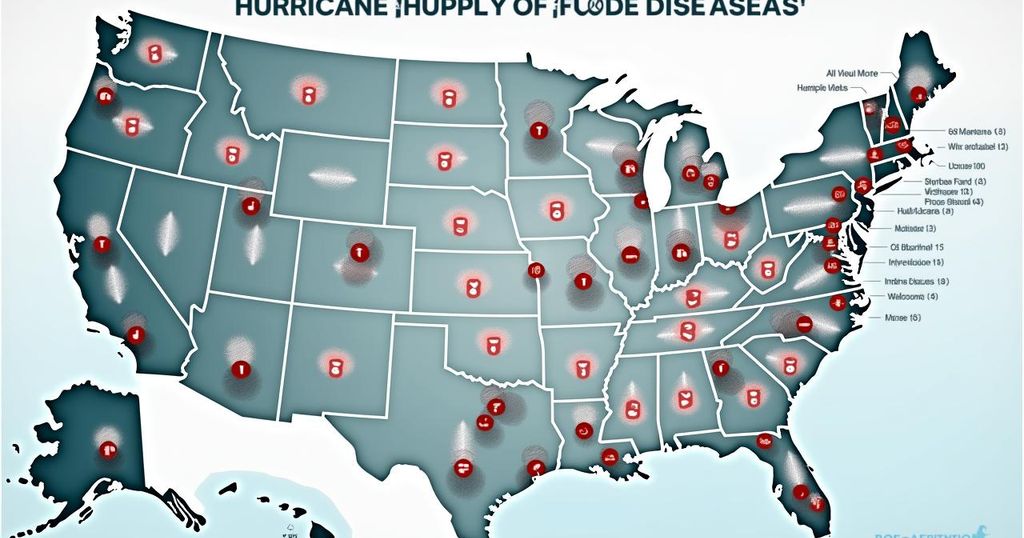Impact of Hurricane Helene on IV Fluid Supplies and Electoral Accessibility
Hospitals across the United States are facing a shortage of intravenous (IV) fluids due to Hurricane Helene, which has flooded a major manufacturing plant operated by Baxter International. The storm has also caused widespread power outages and disruptions to upcoming elections in affected areas, prompting concerns regarding voter turnout and infrastructure resilience as recovery efforts are underway.
The effects of Hurricane Helene are reverberating throughout the United States, particularly in the medical sector, where the availability of intravenous (IV) fluid supplies is at risk. A critical manufacturing facility owned by Baxter International, one of the leading producers of IV solutions, was inundated due to the storm, leading to a significant halt in production. Baxter International, based in North Carolina, was responsible for producing approximately 1.5 million IV solution bags daily, a vital resource for hospitals. Following the flooding, the company announced that it would cease operations to assess damage and prevent further supply interruptions, aiming to ensure that healthcare providers can meet patient needs during this challenging period. In Massachusetts, Mass General Brigham hospital reported a drastic reduction—only receiving 40% of its regular supply from Baxter. As a proactive measure, the hospital has resorted to alternative hydration strategies, offering patients beverages such as Gatorade and plain water to mitigate the impact of the IV fluid shortage, as reported by NBC News. This situation underscores the essential role of IV fluids in delivering necessary medications, nutrients, and hydration directly into patients’ veins. In addition to the medical supply crisis, Hurricane Helene has left over 800,000 residents without power, primarily affecting North Carolina, South Carolina, and Georgia, with some repercussions felt in Florida and Virginia. The storm’s aftermath is also posing challenges for the upcoming presidential election as numerous polling sites in North Carolina have been rendered unusable or severely damaged. During discussions involving the National Task Force on Election Crises, it was noted that many areas will need to combine and relocate voting sites to ensure citizens can exercise their right to vote. Legal experts, including Anne Tindall from Protect Democracy, have highlighted these issues, suggesting that storm conditions are likely to negatively impact voter turnout. The Federal Emergency Management Agency (FEMA) has begun mobilizing resources, having allocated $45 million for hurricane relief efforts to date. Over 6,700 National Guard members from 16 states are assisting in recovery operations, alongside the deployment of 1,000 active-duty military personnel. Meanwhile, Homeland Security Secretary Alejandro Mayorkas has expressed concerns regarding FEMA’s ability to respond to future disasters, indicating financial limitations that could hinder aid efficacy. Thus, the ramifications of Hurricane Helene extend far beyond immediate physical destruction, threatening essential healthcare resources and civic engagement in affected regions as recovery efforts are underway.
Hurricane Helene, which has recently been downgraded to a tropical storm, caused widespread damage across southeastern United States, particularly affecting vital infrastructure and services. As companies like Baxter International halted production due to flooding, hospitals faced immediate supply shortages of crucial IV fluids necessary for patient care. Additionally, the hurricane has complicated logistical operations leading to power outages and potential disruptions in the upcoming elections, indicating the broader systematic vulnerabilities exposed by natural disasters. This situation necessitates both immediate remediation efforts and long-term assessments of emergency preparedness and response capabilities, especially within healthcare facilities and civic institutions.
In summary, Hurricane Helene has initiated a cascade of challenges from medical supply shortages to electoral complications, highlighting the impacts of natural disasters on critical infrastructure. As healthcare providers adapt to limited resources, and civic leaders address the disruption to voting, the ongoing effects of the storm necessitate comprehensive recovery strategies. The situation remains fluid and underscores the importance of resilience in both healthcare and civil engagement systems to adapt to and recover from such catastrophic events.
Original Source: www.bbc.com




Post Comment